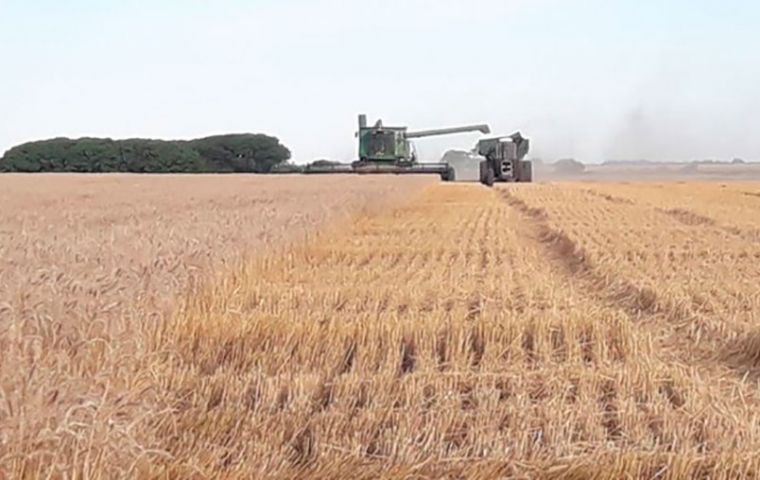MercoPress. South Atlantic News Agency
Mercosur wheat: Argentina lack of water, in Brazil is has been pouring for the last month
 Argentina, has seen its 2022/23 wheat harvest forecast slashed by the Rosario grains exchange to 16.5 million tons, which would be the lowest in seven years
Argentina, has seen its 2022/23 wheat harvest forecast slashed by the Rosario grains exchange to 16.5 million tons, which would be the lowest in seven years Extreme situations with the Mercosur wheat crop: while in Argentina drought is drastically cutting production volumes, in Parana, one of the leading wheat states in Brazil, rainfall has plagued harvests.
In effect, the Argentine government is planning to meet with wheat millers and exporters amid concerns over the size of this year’s crop due to a severe and ongoing drought, according to government and industry sources.
Domestic millers are worried about a lack of wheat after sharp cuts to production forecasts. Likewise exporters fearing the government might decided to give priority to the domestic market.
“We will look at the issues as they rise. Nothing is defined yet,” a government spokesperson said when asked about the meeting and if there could be any potential additional export restrictions put in place to protect domestic supply.
A spokesperson for Argentina’s economy ministry, which sits above the agricultural secretariat, when asked about potential tighter caps on wheat exports, “No. It’s not like that.”
Argentina, a major wheat exporter, has seen its 2022/23 wheat harvest forecast slashed by the major Rosario grains exchange to 16.5 million tons, which would be the lowest in seven years and far below a bumper 23 million tons in 2021/22.
The country’s producers have already formally declared overseas sales of 2022/23 wheat of 8.85 million tons, official data show. There is an existing export cap of 10 million tons for the season’s wheat harvest, but with the new estimates and export sales,. will there be enough wheat for domestic consumption and animal feed.
Brazil is also facing climate upheavals in wheat producing states: excessive rainfall that has been plaguing wheat crops in the state of Parana. According to consultancy SAFRAS & Mercado analyst Élcio Bento, heavy rains should also reach the state’s southwest and south crops, ready to be reaped.
“The quality of the harvested grains should be significantly impacted by the month of nearly nonstop rain. The demand for imports will rise as there is less wheat available to satisfy the high demand from the local industry,” he said.
Besides, if the Rio Grande do Sul harvest reaches its full crop potential without significant quality losses, the mills in Parana should be one of the top destinations for the cereal harvest further down south.
In Rio Grande do Sul, mills are still not very active, with indications below prices offered by international buyers
The wheat harvest for the 2022 crop was completed in 22.4% of the crop area, according to a report by Brazil’s National Supply Company (Conab), with data collected up to October 1. In the previous week, the harvest reached 18.7%. The harvested area reached 22.6% in the same period last year.




Top Comments
Disclaimer & comment rulesCommenting for this story is now closed.
If you have a Facebook account, become a fan and comment on our Facebook Page!